Trump claims he ‘couldn’t stand’ John Kelly and ‘fired him like a dog’
Gustaf Kilander
Thu, 5 October 2023
Donald Trump has claimed that he “couldn’t stand” his ex-chief of staff General John Kelly and that he “fired him like a dog”, in his rage over damning revelations about his comments about veterans.
“John Kelly, by far the dumbest of my Military people, just picked up the theme of the Radical Left’s lying about Gold Star Families and Soldiers, in his hatred of me,” Mr Trump claimed in one of his many Truth Social rants on Wednesday. “He was incapable of doing a good job, it was too much for him, and I couldn’t stand the guy, so I fired him like a ‘dog.’”
“He had no heart or respect for people, so I hit him hard—Made no difference to me,” the former president added. “He’s already on record defending me all over the place. Nobody loves the Military like I do! Now he finally speaks back by making up fake stories, or confirming the made up stories of the Dems and Radical Left…”
Mr Trump lashed out after Gen Kelly provided a statement to CNN confirming that the former president called wounded or killed American soldiers “suckers” and “losers”.
Gen Kelly was the Trump White House chief of staff from 2017 until 2019, brought in to bring order to the administration following the departure of ex-RNC chair Rience Priebus after just six months in the job.
Gen Kelly confirmed details of a story published by The Atlantic in 2020 which outlined offensive comments by Mr Trump. The piece included allegations that Mr Trump refused to visit the Aisne-Marne American Cemetery near Paris in 2018 as he was concerned about what the weather would do to his hair and that he didn’t grasp the value of honouring Americans who died in battle.
“Why should I go to that cemetery? It’s filled with losers,” Mr Trump said, according to the article, which Mr Trump called “fake,” claiming that he thought killed soldiers were “absolute heroes”.
But Gen Kelly confirmed details of the story in his statement to CNN, saying that Mr Trump didn’t understand why Americans revered former prisoners of war as well as those killed in combat.
“What can I add that has not already been said?” Gen Kelly said. “A person that thinks those who defend their country in uniform, or are shot down or seriously wounded in combat, or spend years being tortured as POWs are all ‘suckers’ because ‘there is nothing in it for them.’
“A person that did not want to be seen in the presence of military amputees because ‘it doesn’t look good for me.’
“A person who… rants that our most precious heroes who gave their lives in America’s defense are ‘losers’ and wouldn’t visit their graves in France.
“A person that has no idea what America stands for and has no idea what America is all about. There is nothing more that can be said. God help us.”
Mr Trump has previously argued that the late Senator John McCain (R-AZ), who spent years as a prisoner and was tortured during the Vietnam War, was “not a war hero”.
During his campaign in 2015, Mr Trump spoke about Mr McCain’s 2008 presidential run, saying, “he’s not a war hero. He’s a war hero because he got captured. I like people who weren’t captured”.
Recently retired Joint Chiefs of Staff Chairman Gen Mark Milley recently revealed in another piece in The Atlantic that Mr Trump disparaged Army Captain Luis Avila, a wounded soldier.
“Why do you bring people like that here? No one wants to see that, the wounded,” Mr Trump said, according to the article.
It’s possible that I shall make an ass of myself. But in that case one can always get out of it with a little dialectic. I have, of course, so worded my proposition as to be right either way (K.Marx, Letter to F.Engels on the Indian Mutiny)
Friday, October 06, 2023
Russia strikes deal to build new Black Sea naval base in breakaway Abkhazia region
Euronews
Thu, 5 October 2023
The leader of the breakaway Georgian region of Abkhazia says he's agreed to allow Russia to build a naval base in the Black Sea port of Novorossysk after a series of Ukrainian attacks on Russia's fleet in Sevastopol.
"We have signed an agreement and in the near future in the Ochamchira region there will be a permanent base for the Russian navy," Aslan Bzhania told Izvestiya newspaper on Thursday, one day after meeting with Russia's President Vladimir Putin.
"All this is aimed at increasing the level of defence capabilities of both Russia and Abkhazia, and this type of interaction will continue because it guarantees the interests fundamental interests of both Abkhazia and Russia and security comes first." There are also things I cannot talk about," Bzhania said.
Moscow has recognised the enclave and the territory of South Ossetia as independent states since 2008.
Tbilisi has called the move a gross violation of Georgia's sovereignty.
Some experts say Putin is retreating in the face of Ukraine's counteroffensive, but others say the move is a strategic one.
In a post on X, Britain's Secretary of State for Foreign and Commonwealth Affairs, James Cleverly, warned that Russia may be expanding its naval presence towards Turkey to prevent the safe passage of Ukrainian grain ships.
Others fear that Russia is transferring warships to Abkhazia to pave the way for future annexation.
Only four other countries including Syria and Venezuela recognise the enclave's independence. Georgia considers the region to be under Russian occupation.
Euronews
Thu, 5 October 2023
The leader of the breakaway Georgian region of Abkhazia says he's agreed to allow Russia to build a naval base in the Black Sea port of Novorossysk after a series of Ukrainian attacks on Russia's fleet in Sevastopol.
"We have signed an agreement and in the near future in the Ochamchira region there will be a permanent base for the Russian navy," Aslan Bzhania told Izvestiya newspaper on Thursday, one day after meeting with Russia's President Vladimir Putin.
"All this is aimed at increasing the level of defence capabilities of both Russia and Abkhazia, and this type of interaction will continue because it guarantees the interests fundamental interests of both Abkhazia and Russia and security comes first." There are also things I cannot talk about," Bzhania said.
Moscow has recognised the enclave and the territory of South Ossetia as independent states since 2008.
Tbilisi has called the move a gross violation of Georgia's sovereignty.
Some experts say Putin is retreating in the face of Ukraine's counteroffensive, but others say the move is a strategic one.
In a post on X, Britain's Secretary of State for Foreign and Commonwealth Affairs, James Cleverly, warned that Russia may be expanding its naval presence towards Turkey to prevent the safe passage of Ukrainian grain ships.
Others fear that Russia is transferring warships to Abkhazia to pave the way for future annexation.
Only four other countries including Syria and Venezuela recognise the enclave's independence. Georgia considers the region to be under Russian occupation.
NO ATOMIC TESTING!
Putin Says Russia May Revoke Ban on Nuclear Weapons TestsBloomberg News
Fri, 6 October 2023
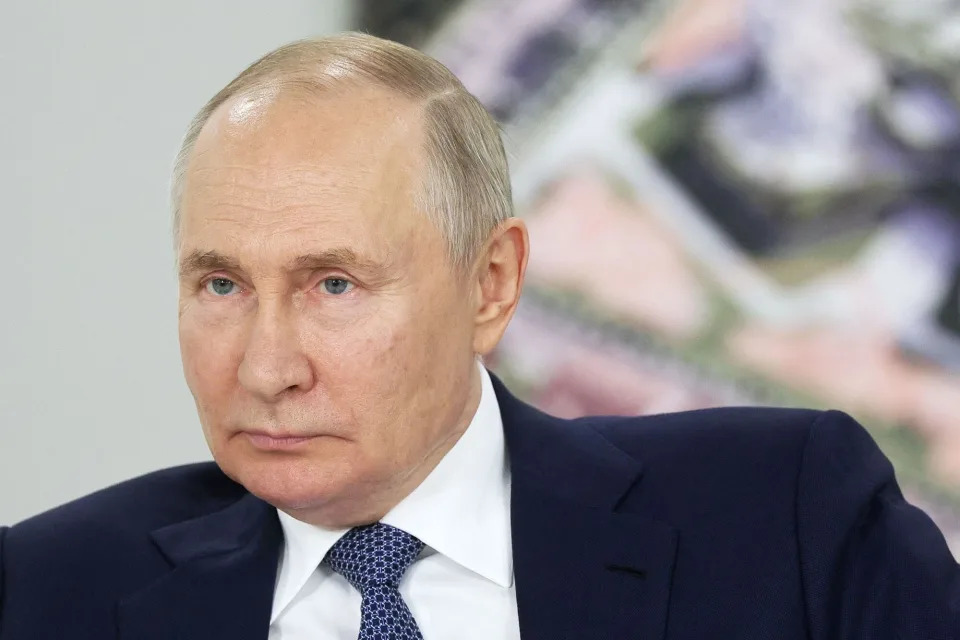
(Bloomberg) -- President Vladimir Putin said Russia may revoke a ban on nuclear weapons tests, complaining about the US failure to ratify a treaty that imposed the prohibition.
“We could mirror the behavior of the US, which signed but didn’t ratify” the 1996 Comprehensive Nuclear Test Ban Treaty, Putin said Thursday at the annual meeting of the Valdai Club in the Black Sea city of Sochi.
“This is a question for lawmakers,” he said. “Theoretically, we can revoke this ratification.”
The speaker of Russia’s lower house of parliament said that lawmakers would discuss withdrawing ratification at their next meeting.
“This is in line with the national interests of our state,” Duma Speaker Vyacheslav Volodin said Friday in a post on Telegram after Putin’s address. “It will be a mirror response to the US, which has not yet ratified the treaty.”
Putin said that military experts advised that tests of new nuclear weapons would provide guarantees that warheads are fully functional. Russia recently successfully tested a nuclear-powered missile called Burevestnik and has just brought into service the Sarmat, an advanced intercontinental nuclear ballistic missile, Putin said.
Russia is one of the 178 countries that have ratified the treaty. The US, one of the 187 nations that signed the agreement, still hasn’t ratified it, which has to be done by a vote in the Senate. The US hasn’t carried out a nuclear test since signing the agreement.
Putin dismissed a call from a member of the audience to lower Russia’s threshold for a nuclear strike, saying there’s no need to change the nuclear doctrine as nothing threatens the country’s existence.
Russia earlier this year delivered tactical nuclear weapons to Belarus, ratcheting up tensions with the US and Europe over the war in Ukraine. Repeated hints from Kremlin officials since the February 2022 invasion of Ukraine that they might use the arms have triggered international alarm and warnings against resorting to nuclear weapons.
(Updates with parliament speaker’s comment in fourth paragraph.)
NO ATOMIC TESTING!
A Kremlin propagandist faced backlash from Siberian officials after saying Russia should detonate a nuke in its own territoryNatalie Musumeci
Thu, 5 October 2023

Margarita Simonyan.AP
A Kremlin propagandist suggested Moscow should drop a nuclear bomb over Siberia, reports said.
The comments by RT editor-in-chief Margarita Simonyan sparked backlash from Siberian officials.
A nuclear bombing over Siberia would send a "painful" message to the West, Simonyan reportedly said.
A loyal Kremlin propagandist suggested that Moscow should drop a nuclear bomb over Siberia as a way to convey a message to the West amid the grinding war with Ukraine, sparking backlash from officials in the Russian territory, according to multiple reports.
Margarita Simonyan, the head of the Russian state television network RT who has been described by the US State Department as one of Russian President Vladimir Putin's "main faces of propaganda and disinformation," made the comments on air this week, according to multiple reports, including The Moscow Times.
"If we were to conduct a thermonuclear explosion, a nuclear explosion, hundreds of kilometers above our own territory, someplace in Siberia, nothing scary would happen on the land," Simonyan said, according to a translation by the Russian Media Monitor.
"There will be no nuclear winter where everyone is afraid. There won't be horrific radiation that will kill everyone … None of that will happen," said Simonyan, according to the project, run by journalist Julia Davis, who monitors and analyzes Russian media.
Simonyan added, according to the translation, that it would "disable" all electronics and satellites and, "We will return to the year 1993."
A nuclear bombing over Siberia would send a "painful" message to the West, Simonyan said, according to a translation by The Moscow Times.
The RT editor-in-chief's remarks were swiftly met with fierce criticism from Siberian officials.
Maria Prusakova, a Communist Party member in the State Duma from Siberia's Altai republic, slammed Simonyan's comments as a "deep insult" and called on Simonyan to apologize, according to The Moscow Times.
Mayor Anatoly Lokot of the Siberian city of Novosibirsk told local media in the aftermath of Simonyan's remarks that there's "nothing good about thermonuclear explosions" and warned that the results of one could have consequences for "thousands of years," The Moscow Times reported.
Nikolai Korolev, an aide to Moscow City Duma deputy Evgeniy Stupin, petitioned Russia's Interior Ministry and Investigative Committee to probe Simonyan's comments, according to the news outlet.
Kremlin spokesman Dmitry Peskov spoke out about Simonyan's remarks, saying that they do not reflect Moscow's official position, The Moscow Times reported.
Meanwhile, Simonyan has since filed a complaint against one of her critics and threatened to sue others for "defamation," according to a tweet from Davis.
Simonyan wrote in a message on Telegram that she did not call for a nuclear strike on Siberia, Russian news outlet Meduza reported.
"This monstrous allegation," Simonyan said, "smears my reputation and inflicts all manner of damages and suffering upon me," according to Meduza.
STOP ATOMIC TESTING!
US moves closer to underground testing of nuclear weapons stockpile without any actual explosionsSCOTT SONNER
Thu, 5 October 2023

In this photo provided by Sandia National Laboratories, a technician inspects cathode inductive voltage adder cells used in the Scorpius Injector being assembled at Sandia National Labs, June 8, 2023, in Albuquerque, N.M. Unable to physically validate the effectiveness and reliability of nuclear warheads since a 1992 underground test ban, the $1.8 billion Scorpius will allow experts to conduct subcritical experiments as early as 2027 in the atomic equivalent of a wind tunnel built for aircraft prohibited from flying. (Craig Fritz/Sandia National Laboratories via AP)

In this photo provided by Sandia National Laboratories, technicians work to test two of the cathode inductive voltage adder cells used in the Scorpius Injector being assembled at Sandia National Labs, June 8, 2023, in Albuquerque, N.M.

this April 22, 1952 file photo, a gigantic pillar of smoke with the familiar mushroom top climbs above Yucca Flat, Nev., during nuclear test detonation. Experts at national defense laboratories haven't been able to physically validate the effectiveness and reliability of nuclear warheads since a 1992 underground test ban. But Energy Department officials announced Thursday, Oct. 5, 2023, they're on the verge of piecing together the technology needed to do the next best thing. (AP Photo/File)
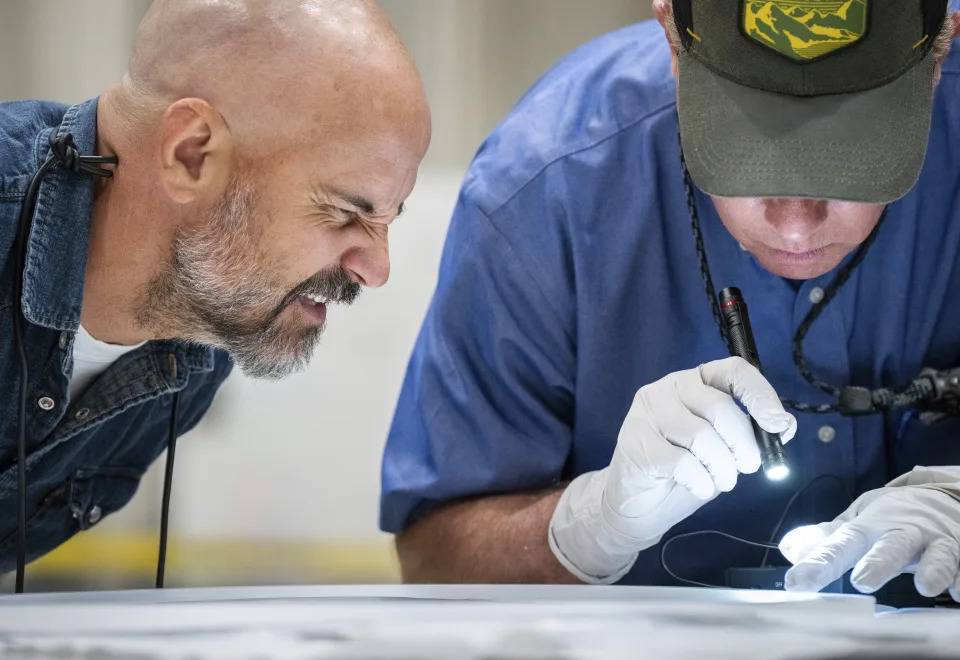
In this photo provided by Sandia National Laboratories, technicians inspect a piece of a cathode inductive voltage adder cell used in the Scorpius Injector being assembled at Sandia National Labs, June 8, 2023, in Albuquerque, N.M. . (Craig Fritz/Sandia National Laboratories via AP)
RENO, Nev. (AP) — Scientists charged with ensuring the aging U.S. stockpile of nuclear weapons are good to go — if needed — say they'll start shipping key components to Nevada's desert next year to prepare for underground testing they call “tickling the dragon's tail.”
Experts at national defense laboratories haven't been able to physically validate the effectiveness and reliability of nuclear warheads since a 1992 underground test ban. But Energy Department officials announced Thursday they're on the verge of piecing together the technology needed to do the next best thing.
As early as 2027, the $1.8 billion Scorpius project will make it possible to move beyond theoretical computer modeling to study in much more detail the conditions found inside the final stages of a nuclear weapon implosion but without the nuclear explosion, said Jon Custer, the Sandia project lead in Albuquerque, New Mexico.
Scientists call it “tickling the dragon’s tail," Custer said, because the experiment approaches but stays below the stage at which the fission of nuclear materials sustains an ongoing series of chain reactions.
The hope is to answer many pivotal questions about whether the nation's aging nuclear weapons still work as designed.
During the Cold War, those questions were answered by actually setting off nuclear explosions. In the 1950s and early 1960s, the explosions sent mushroom clouds high into the skies above the New Mexico and Nevada deserts. Testing later was limited to underground explosions, which ended in 1992.
In the works for 10 years, the new era of testing has advanced to the next phase at Sandia National Laboratories in New Mexico where workers have started assembling the high-energy electron beam injector considered the most complex piece of Scorpius, Energy Department officials said Thursday.
The experimental machine the length of a football field eventually will sit 1,000 feet (304 meters) below the ground at the Nevada National Security Site.
“It’s clear we need to know that the stockpile will work if required,” Custer said.
“If you had a car in a garage for 30 to 50 years and one day you insert the ignition key, how confident are you that it will start?” he asked. “That’s how old our nuclear deterrent is. It has been more than 30 years since we conducted an underground nuclear explosive test.”
The Los Alamos National Lab in northern New Mexico and Lawrence Livermore National Lab in California also have roles in the project.
The injector being assembled at Sandia is a linear induction accelerator that will generate a high-energy electron beam to collide with a metal target generating X-rays that penetrate test objects. As plutonium is compressed with the high explosives, a detector will convert the X-rays into images recorded by a sensitive camera that can capture images at speeds of 1 billion per second.
Those nanosecond portraits will be compared with images of the same events generated by supercomputer codes to check their accuracy.
Scorpius will be fully assembled in an underground complex at the facility formerly known as the Nevada Test Site, where scientists have been conducting subcritical experiments since 1995 and nuclear testing dates to 1951. The facility is about 65 miles (104 kilometers) north of Las Vegas.
Custer said above-ground facilities have tested explosive behaviors of other materials but the Scorpius experiments will use real plutonium, which is unique.
“Nothing else behaves like it,” Custer said. “So, the question to us is, are we feeding accurate data into our codes about plutonium’s behavior?”
Josh Leckbee, who led the injector development and design for Scorpius, said it will provide more confidence in both existing and new designs.
Plans for the complicated project have been the focus of proposals examined over the past decade during a vetting process at the Energy Department that finds and removes conceptual and technical errors before funding can be committed. Final approval came late last year.
The first shipment of key components to Nevada is scheduled to begin in March. Assembly testing is planned through most of 2025 before the Nevada site will move the injector underground.
“We are looking forward to establishing this capability in 2027, conducting the first subcritical experiments using these new capabilities to support our nuclear deterrent and demonstrate once again our technical prowess as a nation,” said Dave Funk, vice-president for Enhanced Capabilities for Subcritical Experiments at the Nevada National Security Site.
India’s Media Arrests Put Washington in an Awkward Spot
Swati Gupta
Wed, 4 October 2023
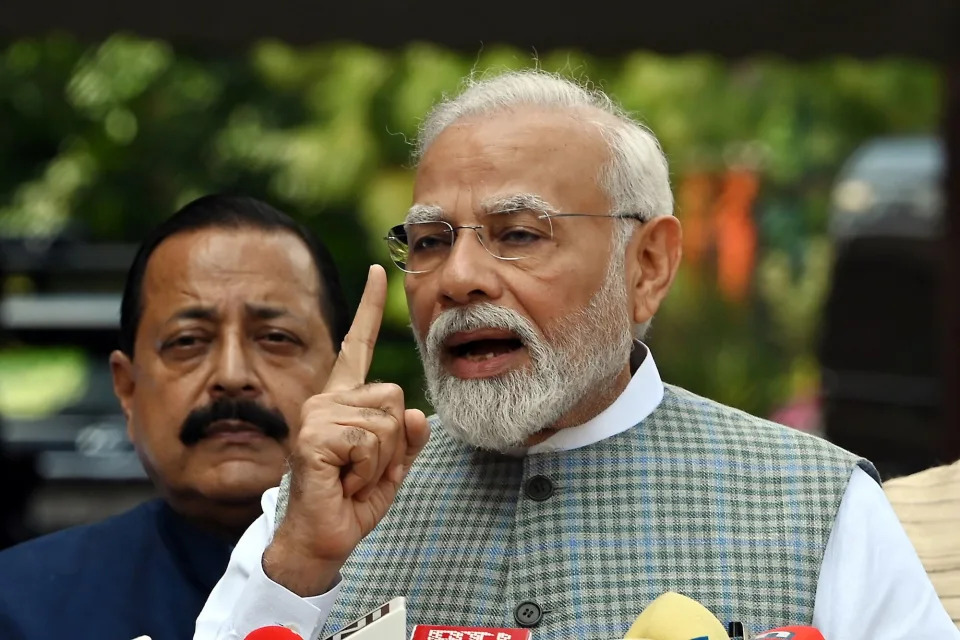
(Bloomberg) -- India’s latest media crackdown puts the US in an awkward position as it seeks to balance promotion of human rights with courting New Delhi to counter the influence of China.
Police in the South Asian country’s capital arrested the editor-in-chief and another employee of online newspaper NewsClick Tuesday under sweeping anti-terrorism laws. Authorities also raided the offices of the publication, without giving a reason.
Prime Minister Narendra Modi’s government has been targeting critical independent media since he took office in 2014. NewsClick came to prominence in 2021 for its extensive coverage of farmer protests against government plans to liberalize agriculture. India has previously accused the media organization of having funding ties to China, which it denies.
For Arati Jerath, a New Delhi-based political analyst, the arrests create a challenge for Washington.
“The US does not want to get too involved in India’s domestic affairs,” she said. “They are looking at India through a geopolitical prism and with China in the picture, India is a strategic partner.”
US Department of State spokesman Vedant Patel said he couldn’t comment yet on claims NewsClick has ties to China.
Patel also stressed the importance of press freedom globally. “We raise concerns on these matters with the Indian government, with countries around the world,” he told reporters in Washington.
India has often argued its democracy and vibrant press are a counterpoint to China with its one-party state and heavily controlled media. The US frequently finds itself torn between its efforts to defend human rights around the world and the pragmatic need to partner with governments accused of rights abuses.
India’s government has often used its anti-terrorism law to intimidate and punish journalists. The law, which doesn’t allow for bail, empowers the police to detain suspects for years without leveling official charges.
India has also scrutinized many mobile app and technology companies for alleged links to China after a Himalayan border clash between New Delhi and Beijing in 2020.
In 2021, authorities raided NewsClick’s office and the homes of seven staff members for what they described as improper foreign investments. Several of them were questioned and NewsClick called the allegations “misleading, unfounded and without basis in fact or law.”
In August, the New York Times cited NewsClick as an organization allegedly being used for Chinese propaganda overseas. India’s Information and Broadcasting Minister Anurag Thakur said at the time the media outlet was being funded by Beijing.
Speaking to reporters on Tuesday, Thakur said he didn’t need to justify the raids. “If someone has done something wrong, the investigative agencies will work on it,” he said.
Free Democracy
NewClick’s human resources head Amit Chakravarty was also arrested. Several employees’ laptops and mobile phones were seized. Local media reported at least 30 premises were raided, including the homes of six NewsClick reporters.
India fell to 161st of 180 countries and territories in a press freedom ranking by Reporters Without Borders, a press advocacy group, this year. In February, authorities raided the BBC’s offices in New Delhi, weeks after the British broadcaster aired a documentary about Modi’s role in 2002 riots in his home state of Gujarat.
Last year, Mohammad Zubair, a journalist running a fact-checking website, Alt News, was arrested after highlighting anti-Islamic comments made by former BJP officials.
The Press Club of India expressed concern about the arrests and raid, saying it wants the government to explain its actions. The group plans to protest the detentions at a march Wednesday.
Jerath, the analyst, questioned India’s move to arrest the people under the terrorism law without providing details or evidence.
“You have already labeled them as terrorists,” she said.
Bloomberg Businessweek
Swati Gupta
Wed, 4 October 2023

(Bloomberg) -- India’s latest media crackdown puts the US in an awkward position as it seeks to balance promotion of human rights with courting New Delhi to counter the influence of China.
Police in the South Asian country’s capital arrested the editor-in-chief and another employee of online newspaper NewsClick Tuesday under sweeping anti-terrorism laws. Authorities also raided the offices of the publication, without giving a reason.
Prime Minister Narendra Modi’s government has been targeting critical independent media since he took office in 2014. NewsClick came to prominence in 2021 for its extensive coverage of farmer protests against government plans to liberalize agriculture. India has previously accused the media organization of having funding ties to China, which it denies.
For Arati Jerath, a New Delhi-based political analyst, the arrests create a challenge for Washington.
“The US does not want to get too involved in India’s domestic affairs,” she said. “They are looking at India through a geopolitical prism and with China in the picture, India is a strategic partner.”
US Department of State spokesman Vedant Patel said he couldn’t comment yet on claims NewsClick has ties to China.
Patel also stressed the importance of press freedom globally. “We raise concerns on these matters with the Indian government, with countries around the world,” he told reporters in Washington.
India has often argued its democracy and vibrant press are a counterpoint to China with its one-party state and heavily controlled media. The US frequently finds itself torn between its efforts to defend human rights around the world and the pragmatic need to partner with governments accused of rights abuses.
India’s government has often used its anti-terrorism law to intimidate and punish journalists. The law, which doesn’t allow for bail, empowers the police to detain suspects for years without leveling official charges.
India has also scrutinized many mobile app and technology companies for alleged links to China after a Himalayan border clash between New Delhi and Beijing in 2020.
In 2021, authorities raided NewsClick’s office and the homes of seven staff members for what they described as improper foreign investments. Several of them were questioned and NewsClick called the allegations “misleading, unfounded and without basis in fact or law.”
In August, the New York Times cited NewsClick as an organization allegedly being used for Chinese propaganda overseas. India’s Information and Broadcasting Minister Anurag Thakur said at the time the media outlet was being funded by Beijing.
Speaking to reporters on Tuesday, Thakur said he didn’t need to justify the raids. “If someone has done something wrong, the investigative agencies will work on it,” he said.
Free Democracy
NewClick’s human resources head Amit Chakravarty was also arrested. Several employees’ laptops and mobile phones were seized. Local media reported at least 30 premises were raided, including the homes of six NewsClick reporters.
India fell to 161st of 180 countries and territories in a press freedom ranking by Reporters Without Borders, a press advocacy group, this year. In February, authorities raided the BBC’s offices in New Delhi, weeks after the British broadcaster aired a documentary about Modi’s role in 2002 riots in his home state of Gujarat.
Last year, Mohammad Zubair, a journalist running a fact-checking website, Alt News, was arrested after highlighting anti-Islamic comments made by former BJP officials.
The Press Club of India expressed concern about the arrests and raid, saying it wants the government to explain its actions. The group plans to protest the detentions at a march Wednesday.
Jerath, the analyst, questioned India’s move to arrest the people under the terrorism law without providing details or evidence.
“You have already labeled them as terrorists,” she said.
Bloomberg Businessweek
Global heat is now ‘gobsmackingly bananas’, but there’s hope humanity can limit the climate damage
Adam Morton

STOCK PHOTO: Massive Blue iceberg in Antarctica
Adam Morton
Guardian Australia
Wed, 4 October 2023
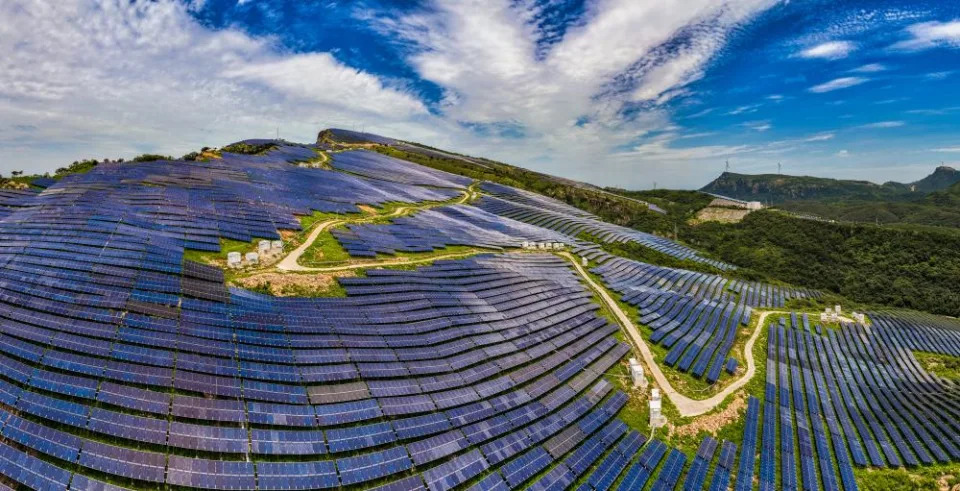
Photograph: VCG/Getty Images
“Absolutely gobsmackingly bananas” is not standard scientific language, but these are not standard times, scientifically.
New data shows average global temperatures in September were not just the hottest ever recorded, but 0.5C above the previous record for the month. They were about 1.8C above temperatures in pre-industrial times, before humans started pumping vast amounts of heat-trapping greenhouse gases into the atmosphere.
The scientist and writer Zeke Hausfather is not prone to hyperbole but was quick to put this into context on social media, saying it was – in his “professional opinion as a climate scientist” – bananas. “It’s hard to overstate just how exceptionally high global temperatures are at the moment,” he said on Bluesky.
Related: ‘Gobsmackingly bananas’: scientists stunned by planet’s record September heat
We’re seeing this in Australia. The Bureau of Meteorology reports that mean temperatures across day and night were even warmer when compared to what we’re used to: 2.43C above the long-term average Australians experienced between 1961 and 1990.
Maximum temperatures – the ones we really need to worry about as we head into summer, when we know heatwaves kill more people than bushfires or other extreme weather events – were 3.38C higher than the long-term average.
The hottest times of the day were particularly ridiculous in southern parts of the continent. In New South Wales, maximum temperatures across September were 5.07C warmer than what we would have expected late last century. Other states were not far behind.
While some set new records, it was not the hottest September ever across the continent – that prize is still held by 2013. But with forest undergrowth lush after three drenched La Niña years, there is plenty to worry about as temperatures rise in the weeks and months ahead.
Bushfires are already burning in three states, including more than 70 in NSW. One of those has destroyed homes on the NSW south coast. We’re not even halfway through spring.
The why of this has been well covered. The simple version is we’re in an El Niño event, which generally makes things hotter. It exacerbates the clear underlying trend of global heating caused by rising atmospheric greenhouse gas concentrations.
I suspect many people may be less across the reasons that we should be optimistic – however cautiously – that humans can get their act together and at least limit the damage from the climate crisis.
Related: The push for nuclear energy in Australia is driven by delay and denial, not evidence | Adam Morton
A report last week by the International Energy Agency – a Paris-based body that was once known for underplaying the rise of renewable energy – makes a case that a change is happening, at least for some technology.
It’s worth a closer look, not least because fossil fuel backers often claim the IEA says the world needs more of what they’re selling. This report – an updated roadmap for how we could keep the global goal of limiting heating to 1.5C within reach – clearly does not say this.
As Carbon Brief has pointed out, it makes three main points. The first is that some important clean energy tech – solar energy, electric cars and battery production – is now being rolled out at a record pace, in line with what is needed to reach global net zero emissions by 2050. Under the IEA’s pathway to zero, solar and EVs could provide one-third of the global emissions cuts needed by 2030.
This tells us that rapid change is possible. In the case of solar, it suggests that it can leapfrog fossil fuels as a primary energy source in the developing world, if influential countries tailor their support in that direction.
The second point is that, more than ever, we have the technology. Two years ago the IEA estimated that the clean technology needed to provide nearly half the emissions reductions across the planet by 2050 was not yet available. That gap has now dropped to 35% as new technology – batteries and electrolysers, for example – has come on. It is likely to continue to fall.
It means the main goal now must be rapid acceleration before 2030. That’s easier said than done, but it’s possible using proven and in most cases affordable strategies. The agency says global renewable energy capacity needs to triple, the pace of energy efficiency improvements needs to double, EVs and heat pump sales need to rise sharply, and methane emissions from fossil fuels – including leaks from coal and gas mines – need to be cut by 75% in that timeframe.
For the clean tech to have the impact that’s required, the approval and development of new fossil fuels needs to stop. This is the third point. It’s consistent with what IEA chief, Fatih Birol, said when the first roadmap was released two years ago.
Related: ‘Staggering’ green growth gives hope for 1.5C, says global energy chief
The IEA now says a concerted expansion of renewable energy could cut global demand for fossil fuels by 25% by 2030 and 80% by 2050. As a result, the world does not need new or extended coalmines, or coal plants that do not capture and store their emissions (and no power stations are meaningfully doing this).
Crucially, in an Australian context, it also says there is no justification for approving new oil and gas developments. It argues that continued investment in some oil and gas projects that either already exist or have been approved is not inconsistent with the global net zero goal, but that the transition to clean energy must be carefully sequenced to ensure there is enough energy to avoid price spikes, but not so much that there is a glut of supply.
If properly handled, the IEA expects this would translate to a significant decline in the global gas supply – a 20% drop by 2030 and a nearly 50% cut by 2035.
The implications of this are pretty clear, if not politically popular.
New fossil fuel developments should not be approved without factoring in global climate goals. And governments will need to take a more interventionist role and make science-based calls about which energy projects should go ahead.
Given the evidence, anything less might be described as bananas.
Adam Morton is Guardian Australia’s climate and environment editor
'A death sentence': September was world's hottest on record by an 'extraordinary' margin
Euronews
Wed, 4 October 2023
After a summer of record-breaking heat, the abnormally hot weather continued into September setting a new mark for the level above a normal temperature for the time of year, the European Union's climate change agency reported today.
Last month’s average global temperature was 0.93°C above the 1991-2020 average for September. This is the warmest margin above average for a month in 83 years of records kept by the Copernicus Climate Change Service.
“It’s just mind-blowing really,” said Copernicus Director Carlo Buontempo. “Never seen anything like that in any month in our records.”

A woman uses a fan in the courtyard of the Louvre museum, Sept. 7, 2023, in Paris. - Thomas Padilla/Copyright 2023 The AP. All rights reserved.
While July and August had higher temperatures because they are warmer months on the calendar, September had what scientists call the biggest anomaly, or departure from normal. Temperature anomalies are crucial pieces of data in a warming world.
“This is not a fancy weather statistic,” Imperial College of London climate scientist Friederike Otto said in an email. “It’s a death sentence for people and ecosystems. It destroys assets, infrastructure, harvest.”
Copernicus calculated the average temperature for September was 16.38°C, which broke the old record set in September 2020 by a whopping half-degree Celsius. This is a huge margin in climate records.
The hot temperatures stretched across the globe. They were chiefly driven by persistent and unusual warmth in the world’s oceans, which didn’t cool off as much in September as normal and have been record-breakingly hot since spring, said Buontempo.
‘Triple whammy’ of extreme heat could make Earth uninhabitable for humans, climate models reveal
October heatwave expected in parts of Europe after countries record hottest ever September
Earth is on track for its hottest year on record, about 1.4°C warmer than pre-industrial times, according to Samantha Burgess, Copernicus’ deputy director.
This past September was 1.75°C warmer than the mid-1800s, Copernicus reported. The world agreed in 2015 to try to limit future warming to 1.5°C warming since pre-industrial times.
The global threshold goal of 1.5°C is for long-term temperature averages, not a single month or year. However, scientists still expressed grave concern at the records being set.
“What we’re seeing right now is the backdrop of rapid global warming at a pace that the Earth has not seen in eons, coupled with El Nino, a natural climate cycle that’s a temporary warming of parts of the Pacific Ocean that changes weather worldwide," said US climate scientist Jessica Moerman, who is also president of the Evangelical Environmental Network. “This double whammy together is where things get dangerous.”

Swimming to cool off - Ariel Schalit/Copyright 2023 The AP. All rights reserved.
Though El Nino is playing a part, climate change has a bigger footprint in this warmth, Buontempo said.
“There really is no end in sight given new oil and gas reserves are still being opened for exploitation,” Otto said. “If you have more record hot events, there is no respite for humans and nature, no time to recover."
Buontempo said El Nino is likely to get warmer and cause even higher temperatures next year.
From onions to rice, there’s a ‘contagion’ in staple food restrictions. Is climate change to blame?
El Niño is back: Surging temperatures bring extreme weather and threaten lives
“This month was, in my professional opinion as a climate scientist, absolutely gobsmackingly bananas,” climate scientist Zeke Hausfather said on X, formerly known as Twitter.
2023 on track to become warmest year on record: Copernicus report
JULIA JACOBO and DANIEL PECK
Wed, 4 October 2023

People enjoy the sunshine while punting on the River Cam in Cambridge, north of London, Sept. 9, 2023, as the late summer heatwave continues.
Wed, 4 October 2023

Photograph: VCG/Getty Images
“Absolutely gobsmackingly bananas” is not standard scientific language, but these are not standard times, scientifically.
New data shows average global temperatures in September were not just the hottest ever recorded, but 0.5C above the previous record for the month. They were about 1.8C above temperatures in pre-industrial times, before humans started pumping vast amounts of heat-trapping greenhouse gases into the atmosphere.
The scientist and writer Zeke Hausfather is not prone to hyperbole but was quick to put this into context on social media, saying it was – in his “professional opinion as a climate scientist” – bananas. “It’s hard to overstate just how exceptionally high global temperatures are at the moment,” he said on Bluesky.
Related: ‘Gobsmackingly bananas’: scientists stunned by planet’s record September heat
We’re seeing this in Australia. The Bureau of Meteorology reports that mean temperatures across day and night were even warmer when compared to what we’re used to: 2.43C above the long-term average Australians experienced between 1961 and 1990.
Maximum temperatures – the ones we really need to worry about as we head into summer, when we know heatwaves kill more people than bushfires or other extreme weather events – were 3.38C higher than the long-term average.
The hottest times of the day were particularly ridiculous in southern parts of the continent. In New South Wales, maximum temperatures across September were 5.07C warmer than what we would have expected late last century. Other states were not far behind.
While some set new records, it was not the hottest September ever across the continent – that prize is still held by 2013. But with forest undergrowth lush after three drenched La Niña years, there is plenty to worry about as temperatures rise in the weeks and months ahead.
Bushfires are already burning in three states, including more than 70 in NSW. One of those has destroyed homes on the NSW south coast. We’re not even halfway through spring.
The why of this has been well covered. The simple version is we’re in an El Niño event, which generally makes things hotter. It exacerbates the clear underlying trend of global heating caused by rising atmospheric greenhouse gas concentrations.
I suspect many people may be less across the reasons that we should be optimistic – however cautiously – that humans can get their act together and at least limit the damage from the climate crisis.
Related: The push for nuclear energy in Australia is driven by delay and denial, not evidence | Adam Morton
A report last week by the International Energy Agency – a Paris-based body that was once known for underplaying the rise of renewable energy – makes a case that a change is happening, at least for some technology.
It’s worth a closer look, not least because fossil fuel backers often claim the IEA says the world needs more of what they’re selling. This report – an updated roadmap for how we could keep the global goal of limiting heating to 1.5C within reach – clearly does not say this.
As Carbon Brief has pointed out, it makes three main points. The first is that some important clean energy tech – solar energy, electric cars and battery production – is now being rolled out at a record pace, in line with what is needed to reach global net zero emissions by 2050. Under the IEA’s pathway to zero, solar and EVs could provide one-third of the global emissions cuts needed by 2030.
This tells us that rapid change is possible. In the case of solar, it suggests that it can leapfrog fossil fuels as a primary energy source in the developing world, if influential countries tailor their support in that direction.
The second point is that, more than ever, we have the technology. Two years ago the IEA estimated that the clean technology needed to provide nearly half the emissions reductions across the planet by 2050 was not yet available. That gap has now dropped to 35% as new technology – batteries and electrolysers, for example – has come on. It is likely to continue to fall.
It means the main goal now must be rapid acceleration before 2030. That’s easier said than done, but it’s possible using proven and in most cases affordable strategies. The agency says global renewable energy capacity needs to triple, the pace of energy efficiency improvements needs to double, EVs and heat pump sales need to rise sharply, and methane emissions from fossil fuels – including leaks from coal and gas mines – need to be cut by 75% in that timeframe.
For the clean tech to have the impact that’s required, the approval and development of new fossil fuels needs to stop. This is the third point. It’s consistent with what IEA chief, Fatih Birol, said when the first roadmap was released two years ago.
Related: ‘Staggering’ green growth gives hope for 1.5C, says global energy chief
The IEA now says a concerted expansion of renewable energy could cut global demand for fossil fuels by 25% by 2030 and 80% by 2050. As a result, the world does not need new or extended coalmines, or coal plants that do not capture and store their emissions (and no power stations are meaningfully doing this).
Crucially, in an Australian context, it also says there is no justification for approving new oil and gas developments. It argues that continued investment in some oil and gas projects that either already exist or have been approved is not inconsistent with the global net zero goal, but that the transition to clean energy must be carefully sequenced to ensure there is enough energy to avoid price spikes, but not so much that there is a glut of supply.
If properly handled, the IEA expects this would translate to a significant decline in the global gas supply – a 20% drop by 2030 and a nearly 50% cut by 2035.
The implications of this are pretty clear, if not politically popular.
New fossil fuel developments should not be approved without factoring in global climate goals. And governments will need to take a more interventionist role and make science-based calls about which energy projects should go ahead.
Given the evidence, anything less might be described as bananas.
Adam Morton is Guardian Australia’s climate and environment editor
'A death sentence': September was world's hottest on record by an 'extraordinary' margin
Euronews
Wed, 4 October 2023
After a summer of record-breaking heat, the abnormally hot weather continued into September setting a new mark for the level above a normal temperature for the time of year, the European Union's climate change agency reported today.
Last month’s average global temperature was 0.93°C above the 1991-2020 average for September. This is the warmest margin above average for a month in 83 years of records kept by the Copernicus Climate Change Service.
“It’s just mind-blowing really,” said Copernicus Director Carlo Buontempo. “Never seen anything like that in any month in our records.”

A woman uses a fan in the courtyard of the Louvre museum, Sept. 7, 2023, in Paris. - Thomas Padilla/Copyright 2023 The AP. All rights reserved.
While July and August had higher temperatures because they are warmer months on the calendar, September had what scientists call the biggest anomaly, or departure from normal. Temperature anomalies are crucial pieces of data in a warming world.
“This is not a fancy weather statistic,” Imperial College of London climate scientist Friederike Otto said in an email. “It’s a death sentence for people and ecosystems. It destroys assets, infrastructure, harvest.”
Copernicus calculated the average temperature for September was 16.38°C, which broke the old record set in September 2020 by a whopping half-degree Celsius. This is a huge margin in climate records.
The hot temperatures stretched across the globe. They were chiefly driven by persistent and unusual warmth in the world’s oceans, which didn’t cool off as much in September as normal and have been record-breakingly hot since spring, said Buontempo.
‘Triple whammy’ of extreme heat could make Earth uninhabitable for humans, climate models reveal
October heatwave expected in parts of Europe after countries record hottest ever September
Earth is on track for its hottest year on record, about 1.4°C warmer than pre-industrial times, according to Samantha Burgess, Copernicus’ deputy director.
This past September was 1.75°C warmer than the mid-1800s, Copernicus reported. The world agreed in 2015 to try to limit future warming to 1.5°C warming since pre-industrial times.
The global threshold goal of 1.5°C is for long-term temperature averages, not a single month or year. However, scientists still expressed grave concern at the records being set.
“What we’re seeing right now is the backdrop of rapid global warming at a pace that the Earth has not seen in eons, coupled with El Nino, a natural climate cycle that’s a temporary warming of parts of the Pacific Ocean that changes weather worldwide," said US climate scientist Jessica Moerman, who is also president of the Evangelical Environmental Network. “This double whammy together is where things get dangerous.”

Swimming to cool off - Ariel Schalit/Copyright 2023 The AP. All rights reserved.
Though El Nino is playing a part, climate change has a bigger footprint in this warmth, Buontempo said.
“There really is no end in sight given new oil and gas reserves are still being opened for exploitation,” Otto said. “If you have more record hot events, there is no respite for humans and nature, no time to recover."
Buontempo said El Nino is likely to get warmer and cause even higher temperatures next year.
From onions to rice, there’s a ‘contagion’ in staple food restrictions. Is climate change to blame?
El Niño is back: Surging temperatures bring extreme weather and threaten lives
“This month was, in my professional opinion as a climate scientist, absolutely gobsmackingly bananas,” climate scientist Zeke Hausfather said on X, formerly known as Twitter.
2023 on track to become warmest year on record: Copernicus report
JULIA JACOBO and DANIEL PECK
Wed, 4 October 2023

People enjoy the sunshine while punting on the River Cam in Cambridge, north of London, Sept. 9, 2023, as the late summer heatwave continues.
(Justin Tallis/AFP via Getty Images)
The year 2023 is already on track to be the warmest year on record, according to Copernicus, Europe’s climate change service.
The month of September saw several unprecedented temperature anomalies around the world, following the hottest summer ever recorded, according to the monthly climate report released by Copernicus on Wednesday, which analyzes billions of measurements from satellites, ships, aircraft and weather stations around the world to highlight changes observed in global surface air temperature, sea ice cover and hydrological variables.
MORE: Record-high summer temps give a 'sneak peek' into future warming
Several records were broken "by an extraordinary amount" in September due to never-before-seen high temperatures for that time of year, Samantha Burgess, deputy director of the Copernicus Climate Change Service, said in a statement. The month as a whole was around 1.75 degrees Celsius (3.2 Fahrenheit) warmer than the September average for 1850 to 1900, the preindustrial reference period, according to the report.
Now, 2023 is expected to round out the year as the warmest on record globally -- clocking in at about 1.4 C above pre-industrial levels, Burgess said.
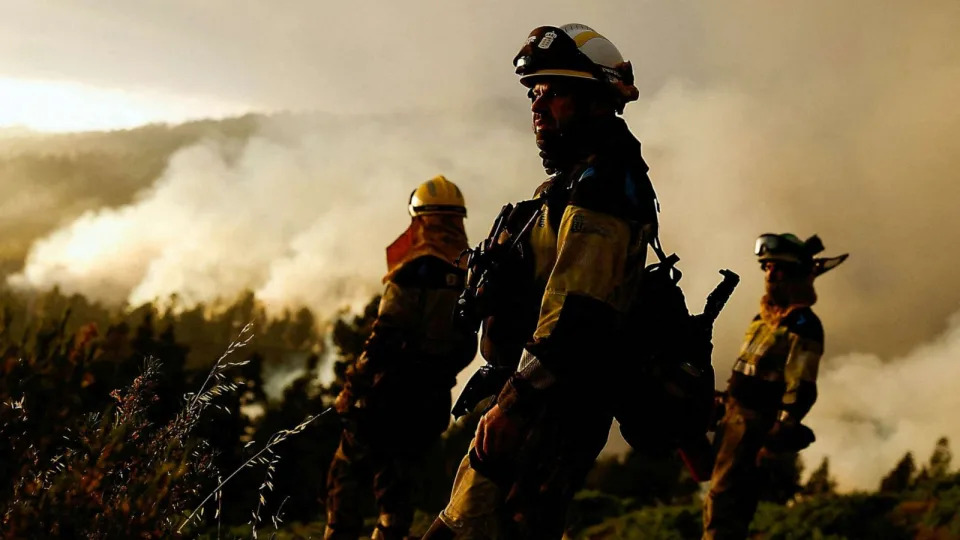
PHOTO: FILE - EIRIF forest firefighters work during the extinction of the Tijarafe fire on the Canary Island of La Palma, Spain July 16, 2023. (Borja Suarez/Reuters, FILE)
The number is dangerously close to the goal to limit global warming to 1.5 C (2.7 F) above pre-industrial levels set in the Paris Agreement.
MORE: Earth has experienced its warmest August on record, says NOAA
Average global surface air temperatures in September 2023 measured at 16.38 C, about 61.48 F, nearly 1 degree Celsius above the 1991 to 2020 average for September and beating the previous record, set in 2020, by .5 degrees Celsius, according to Copernicus.
The global temperature during September 2023 featured the largest deviation from the average, not just for the month of September, but for any month in the dataset going back to 1940, the researchers said.
Among the continents that experienced warmer-than-usual conditions in September was Europe, which beat its previous record by 1.1 degrees Celsius.
MORE: July poised to be hottest month in recorded history: Experts
Antarctic sea ice extent also remained at a record low level during the month of September. Both the daily and monthly extents reached their lowest annual maxima in the satellite record in September, with the monthly extent 9% below average, according to the report.
Greenhouse gas emissions and El Niño conditions over the equatorial eastern Pacific are likely both playing a role in reaching new global temperature records, models show.
The year 2023 is already on track to be the warmest year on record, according to Copernicus, Europe’s climate change service.
The month of September saw several unprecedented temperature anomalies around the world, following the hottest summer ever recorded, according to the monthly climate report released by Copernicus on Wednesday, which analyzes billions of measurements from satellites, ships, aircraft and weather stations around the world to highlight changes observed in global surface air temperature, sea ice cover and hydrological variables.
MORE: Record-high summer temps give a 'sneak peek' into future warming
Several records were broken "by an extraordinary amount" in September due to never-before-seen high temperatures for that time of year, Samantha Burgess, deputy director of the Copernicus Climate Change Service, said in a statement. The month as a whole was around 1.75 degrees Celsius (3.2 Fahrenheit) warmer than the September average for 1850 to 1900, the preindustrial reference period, according to the report.
Now, 2023 is expected to round out the year as the warmest on record globally -- clocking in at about 1.4 C above pre-industrial levels, Burgess said.

PHOTO: FILE - EIRIF forest firefighters work during the extinction of the Tijarafe fire on the Canary Island of La Palma, Spain July 16, 2023. (Borja Suarez/Reuters, FILE)
The number is dangerously close to the goal to limit global warming to 1.5 C (2.7 F) above pre-industrial levels set in the Paris Agreement.
MORE: Earth has experienced its warmest August on record, says NOAA
Average global surface air temperatures in September 2023 measured at 16.38 C, about 61.48 F, nearly 1 degree Celsius above the 1991 to 2020 average for September and beating the previous record, set in 2020, by .5 degrees Celsius, according to Copernicus.
The global temperature during September 2023 featured the largest deviation from the average, not just for the month of September, but for any month in the dataset going back to 1940, the researchers said.
Among the continents that experienced warmer-than-usual conditions in September was Europe, which beat its previous record by 1.1 degrees Celsius.
MORE: July poised to be hottest month in recorded history: Experts
Antarctic sea ice extent also remained at a record low level during the month of September. Both the daily and monthly extents reached their lowest annual maxima in the satellite record in September, with the monthly extent 9% below average, according to the report.
Greenhouse gas emissions and El Niño conditions over the equatorial eastern Pacific are likely both playing a role in reaching new global temperature records, models show.

STOCK PHOTO: Massive Blue iceberg in Antarctica
(STOCK PHOTO/Getty Images)
With El Niño conditions forecast to strengthen through the end of the year, the annual temperature anomaly for 2023 could follow trends set in Summer 2023 and September 2023, breaking the previous record by a large margin.
Globally, 2023 has already featured the hottest summer on record, multiple hottest months on record, including July and August, and the hottest day recorded on Earth for several days in a row at the beginning of July.
The last time Earth recorded a colder-than-average year was in 1976.
With El Niño conditions forecast to strengthen through the end of the year, the annual temperature anomaly for 2023 could follow trends set in Summer 2023 and September 2023, breaking the previous record by a large margin.
Globally, 2023 has already featured the hottest summer on record, multiple hottest months on record, including July and August, and the hottest day recorded on Earth for several days in a row at the beginning of July.
The last time Earth recorded a colder-than-average year was in 1976.
STUDENTS @RE REVOLTING
Disruptive behaviour in English schools worse since Covid, says outgoing Ofsted head
Sally Weale Education correspondent
Thu, 5 October 2023

Photograph: David Levene/The Guardian
Behaviour in schools in England has deteriorated since the pandemic, with pupils refusing to comply with rules, talking back to teachers and walking out of class mid-lesson, the head of Ofsted says.
Suspensions for physical assault, threatening behaviour and verbal abuse have increased, with even primary schoolchildren being defiant and refusing to follow simple classroom instructions, such as to get out their books.
Disruptive behaviour in English schools worse since Covid, says outgoing Ofsted head
Sally Weale Education correspondent
Thu, 5 October 2023

Photograph: David Levene/The Guardian
Behaviour in schools in England has deteriorated since the pandemic, with pupils refusing to comply with rules, talking back to teachers and walking out of class mid-lesson, the head of Ofsted says.
Suspensions for physical assault, threatening behaviour and verbal abuse have increased, with even primary schoolchildren being defiant and refusing to follow simple classroom instructions, such as to get out their books.
In some cases, children are turning up at school for registration but, despite being on the premises, failing to attend any lessons, the outgoing chief inspector of schools in England, Amanda Spielman, said in an exclusive interview with the Guardian.
Poor behaviour and disruption in the classroom were contributing to anxiety and poor mental health among some pupils, she said, which was, in turn, adding to high levels of absence in English schools.
More than two out of five teachers (42%) who took part in a recent Ofsted survey on pupil behaviour said it had worsened since the pandemic. Initial findings from new Ofsted research, due to be published next year, show the three most frequent behaviour issues are persistent low-level disruption, cited by more than two-thirds of staff (67%), refusal behaviour or passive non-compliance, where a child ignores an authority figure (67%), and talking back at teaching staff (64%).
“This is across the system,” said Spielman. “There’s definitely some real challenges for schools to manage at the moment. Schools are having to deal with things like more children just walking out of classes, or being registered at school but failing to show up in lessons.”
Spielman will address some of these issues in a speech to the Confederation of School Trusts on Friday, when she is expected to say: “I know how hard it is for many of you to deal with challenging behaviour at the moment. But poor behaviour can make other children anxious about school.
“Clear rules and expectations, consistently applied, and with known consequences for breaking them, are, of course, an important element of a proven approach. But it’s not enough just to set the rules and sit back. Children need to be taught behaviour and routines explicitly, and be given time to learn and practise meeting those expectations.”
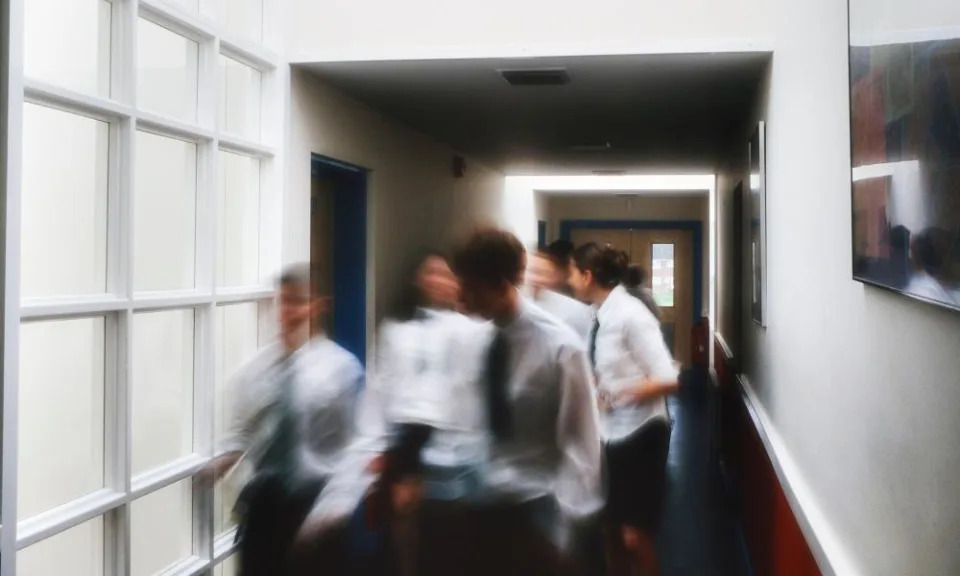
More than two out of five teachers (42%) who took part in a recent Ofsted survey said behaviour had worsened since the pandemic. Photograph: parkerphotography/Alamy
The government’s own figures show the number of temporary suspensions went up to more than half a million (578,280) in 2021-2 – the latest year for which figures are available, an increase from 352,454 in 2020-21 – when schools were severely disrupted by Covid – and 438,300 in 2018-19, before the pandemic. The most common reason for a temporary suspension was persistent disruptive behaviour.
Spielman blames the increase in disruptive behaviour on the loss of socialisation as a result of Covid. “A lot of people have had a lot less of that socialisation. Many young people have not had as much of the experience and opportunity to practise as they normally would have done.”
The chief inspector was speaking shortly after the education secretary, Gillian Keegan, addressing the Conservative party conference, announced new guidance to ban mobile phones throughout the school day in an effort to reduce distraction, disruptive behaviour and bullying.
Spielman said the ban could help with behaviour issues but was not “a magic bullet”, adding that the damage done by Covid lockdowns would take years to repair. “I don’t want to be over-optimistic, nor do I want to be apocalyptic. I just want to acknowledge this is a multi-year challenge.”
In a wide-ranging interview, Spielman also rejected criticism of Ofsted, especially over the death of the Berkshire primary headteacher’s Ruth Perry, saying the inspectorate was merely carrying out government policy and if people wanted a different Ofsted, it was up to the government to change it.
Perry’s death is the subject of an inquest hearing next month, but her family have said she killed herself after a devastating Ofsted inspection. Spielman said it would be inappropriate to comment, saying only: “I totally understand that it’s been a very difficult time for the family and we have to leave the inquest to do its job.”
Sir Martyn Oliver, chief executive of the Outwood Grange academies trust, has been confirmed as the next chief inspector of schools.
The Department for Education said: “Poor behaviour disrupts lessons and has a profound effect on teachers. We are determined all pupils learn in a calm environment, which is why just this week we have banned mobile phone use in schools.
“This is on top of our ongoing £10m behaviour hubs programme, which is supporting up to 700 schools to improve their behaviour. We are also supporting schools through our recently expanded attendance hubs, mentors programme and by setting up the attendance action alliance of national leaders from education, children’s social care and allied services.”
Poor behaviour and disruption in the classroom were contributing to anxiety and poor mental health among some pupils, she said, which was, in turn, adding to high levels of absence in English schools.
More than two out of five teachers (42%) who took part in a recent Ofsted survey on pupil behaviour said it had worsened since the pandemic. Initial findings from new Ofsted research, due to be published next year, show the three most frequent behaviour issues are persistent low-level disruption, cited by more than two-thirds of staff (67%), refusal behaviour or passive non-compliance, where a child ignores an authority figure (67%), and talking back at teaching staff (64%).
“This is across the system,” said Spielman. “There’s definitely some real challenges for schools to manage at the moment. Schools are having to deal with things like more children just walking out of classes, or being registered at school but failing to show up in lessons.”
Spielman will address some of these issues in a speech to the Confederation of School Trusts on Friday, when she is expected to say: “I know how hard it is for many of you to deal with challenging behaviour at the moment. But poor behaviour can make other children anxious about school.
“Clear rules and expectations, consistently applied, and with known consequences for breaking them, are, of course, an important element of a proven approach. But it’s not enough just to set the rules and sit back. Children need to be taught behaviour and routines explicitly, and be given time to learn and practise meeting those expectations.”

More than two out of five teachers (42%) who took part in a recent Ofsted survey said behaviour had worsened since the pandemic. Photograph: parkerphotography/Alamy
The government’s own figures show the number of temporary suspensions went up to more than half a million (578,280) in 2021-2 – the latest year for which figures are available, an increase from 352,454 in 2020-21 – when schools were severely disrupted by Covid – and 438,300 in 2018-19, before the pandemic. The most common reason for a temporary suspension was persistent disruptive behaviour.
Spielman blames the increase in disruptive behaviour on the loss of socialisation as a result of Covid. “A lot of people have had a lot less of that socialisation. Many young people have not had as much of the experience and opportunity to practise as they normally would have done.”
The chief inspector was speaking shortly after the education secretary, Gillian Keegan, addressing the Conservative party conference, announced new guidance to ban mobile phones throughout the school day in an effort to reduce distraction, disruptive behaviour and bullying.
Spielman said the ban could help with behaviour issues but was not “a magic bullet”, adding that the damage done by Covid lockdowns would take years to repair. “I don’t want to be over-optimistic, nor do I want to be apocalyptic. I just want to acknowledge this is a multi-year challenge.”
The chief inspector, who is due to step down at the end of 2023 after seven years in the job, also called for the government urgently to issue its long-awaited transgender guidance for schools, which Rishi Sunak promised to publish earlier this summer but which has been subject to lengthy delays.
She said the issue was taking up “disproportionate” amounts of school time as headteachers struggled to navigate complicated issues on a case-by-case basis, relying on ad hoc materials from various groups.
“I don’t believe it’s fair or realistic to expect every school to make decisions individually, in the absence of a clear framework,” Spielman said. “It’s something that is taking up disproportionate amounts of school time, at a time when management capacity is absolutely at a premium. So let’s make the job easier for schools by getting that guidance out.”
She said the issue was taking up “disproportionate” amounts of school time as headteachers struggled to navigate complicated issues on a case-by-case basis, relying on ad hoc materials from various groups.
“I don’t believe it’s fair or realistic to expect every school to make decisions individually, in the absence of a clear framework,” Spielman said. “It’s something that is taking up disproportionate amounts of school time, at a time when management capacity is absolutely at a premium. So let’s make the job easier for schools by getting that guidance out.”
In a wide-ranging interview, Spielman also rejected criticism of Ofsted, especially over the death of the Berkshire primary headteacher’s Ruth Perry, saying the inspectorate was merely carrying out government policy and if people wanted a different Ofsted, it was up to the government to change it.
Perry’s death is the subject of an inquest hearing next month, but her family have said she killed herself after a devastating Ofsted inspection. Spielman said it would be inappropriate to comment, saying only: “I totally understand that it’s been a very difficult time for the family and we have to leave the inquest to do its job.”
Sir Martyn Oliver, chief executive of the Outwood Grange academies trust, has been confirmed as the next chief inspector of schools.
The Department for Education said: “Poor behaviour disrupts lessons and has a profound effect on teachers. We are determined all pupils learn in a calm environment, which is why just this week we have banned mobile phone use in schools.
“This is on top of our ongoing £10m behaviour hubs programme, which is supporting up to 700 schools to improve their behaviour. We are also supporting schools through our recently expanded attendance hubs, mentors programme and by setting up the attendance action alliance of national leaders from education, children’s social care and allied services.”
CRIMINAL CAPITALI$M
FTX co-founder testifies he committed crimes with Sam Bankman-FriedVictoria Bekiempis in New York
Thu, 5 October 2023

Photograph: Jane Rosenberg/Reuters
Sam Bankman-Fried’s crypto fraud trial gained steam on Thursday when the co-founder of his fallen exchange, Gary Wang, took the stand as a government witness in Manhattan federal court.
His testimony came as the highly anticipated trial entered its third day. Bankman-Fried faces seven counts on fraud and conspiracy charges in relation to the implosion of his crypto exchange FTX and its related hedge fund, Alameda Research.
The prosecutor Nicolas Roos asked Wang outright if he had committed financial crimes while working at FTX.
Related: Sam Bankman-Fried built empire on ‘lies’, prosecutor says in fraud trial
“Yes,” Wang said. He then said the crimes included commodities and wire fraud.
“Who are the main people you committed these crimes with?”
“Sam Bankman-Fried, Nishad Singh and Caroline Ellison,” Wang said.
“Mr Wang, do you see any of the people you committed those crimes with in the courtroom today?”
Wang craned his neck and looked around, as if he were having trouble seeing who was in the courtroom. After a moment, he said: “Yes.”
“Who do you see?”
“Sam Bankman-Fried.”
Wang previously pleaded guilty to his role in FTX’s downfall. He is testifying under a plea agreement, according to court testimony.
Earlier on Thursday, one of Bankman-Fried’s former allies, Adam Yedidia, took the stand. Yedidia was the second witness to testify, and did so under an immunity order, meaning he cannot be charged based on his testimony, so long as it is truthful.

Adam Yedidia in this courtroom sketch. Photograph: Jane Rosenberg/Reuters
Yedidia testified about how the FTX founder helmed business operations – undermining defense claims that the disgraced crypto whiz was just a “math nerd” who fell in over his head.
“He was the CEO – so, sort of in charge of everything,” said Yedidia, in response to the prosecutor Danielle Sassoon’s question about Bankman-Fried’s role at FTX.
Yedidia also provided insight into Bankman-Fried’s relationship with Caroline Ellison, his sometimes girlfriend and Alameda Research chief turned government witness.
“Sometime in early 2019, the defendant told me that he and Caroline had had sex, and asked if it was a good idea to date,” Yedidia said, responding to Sassoon’s question about what Bankman-Fried had told him about Ellison.
“I said no.”
“How did he respond to that?” Sassoon said.
“He said he figured it was what [he] thought I would say,” Yedidia said.
Throughout much of the morning session, Bankman-Fried shook his right leg, giving him an air of subdued nervousness. At one point, Bankman-Fried drank water from a bottle so aggressively that the plastic crackled.
When Bankman-Fried entered the courtroom about 9.20am, he nodded to members of his legal team and his parents, who were seated in the gallery. His mother and father, both Stanford Law professors, took turns scribbling notes on a yellow legal pad.
Earlier on Thursday morning, Yedidia explained that he was Bankman-Fried’s friend from the Massachusetts Institute of Technology (MIT) and worked at FTX.
“We were close friends,” Yedidia said on Wednesday. They lived together at times and worked together, he said, which at one point came to include at FTX.
Sassoon used the close relationship of Yedidia and Bankman-Fried to explore the FTX inner circle’s luxe lifestyle and allege how it hid a house of cards. She asked Yedidia about their now infamous $35m apartment at the Albany, a tony community in the Bahamas.
Yedidia described it as a “luxury resort” on the western side of New Providence. Sassoon showed jurors a photo of the apartment, which revealed a sprawling living space with sparkling marble floors and a leggy black piano.
She also showed jurors a series of exchanges in a messaging group called “People of The House”. Yedidia said the rent on this apartment seemed like it would be very high, considering its multimillion-dollar valuation.
Bankman-Fried addressed rent costs. “Heh I’ve been mentally assuming that aggregate rent collected would be zero dollars …” he wrote, because Alameda was paying for it.
Yedidia said he last saw Bankman-Fried in November 2022 and had not spoken to him since. He described how he learned of FTX’s financial woes – and the dramatic turn of events that led him to step away from his longtime friend.
Yedidia was tasked with fixing a bug in company software that gave the appearance that Alameda owed FTX customers $16bn in 2022. He fixed the bug – only to discover that Alameda owed FTX $8bn in customer funds.
He initially offered his support to Bankman-Fried, but soon changed course.
The week that FTX declared bankruptcy, “I received a phone call from another developer at the company,” Yedidia said in explaining his departure. “I heard that Alameda Research had used FTX customer profits to pay back its loans to creditors.”
“After you learned that, what did you do?” Sassoon asked.
“I resigned,” Yedidia said.
Yedidia was asked why he was testifying with an immunity order.
“I was concerned that, as a developer for FTX, I may have unwittingly written a code that contributed to a crime,” he said.
On cross-examination, Bankman-Fried’s attorney Christian Everdell tried to dissuade any notion that his client was a dilettante who relished in ill-gained riches. Everdell asked Yedidia about Bankman-Fried’s spending habits.
“He didn’t buy, for example fancy watches, did he?”
“Not to my knowledge, no.”
“He didn’t buy an expensive sports car?”
“No.”
“He didn’t buy a yacht?”
“To my knowledge, he did not buy himself a yacht.”
Everdell also pressed Yedidia on Bankman-Fried’s manner of dress.
“I didn’t see him in fancy clothes,” Yedidia testified. “He would typically wear a T-shirt and shorts.”
He also tried to downplay their lavish digs in the Bahamas, where there were 10 people in the penthouse.
“This was essentially dorm living?” Everdell asked.
“It was similar to dorm living in some senses and different in others.”
The prosecutor also returned to Yedidia’s decision to leave FTX despite professing loyalty to Bankman-Fried. Why did his opinion change?
Related: Sam Bankman-Fried trial: ‘I may have unwittingly contributed to a crime’, FTX developer tells court – as it happened
“Well, FTX defrauded all of its customers,” he said.
The prosecutor Thane Rehn has portrayed Bankman-Fried as an unrepentant huckster who pocketed FTX customer funds for his own purposes – and to buoy Alameda as crypto’s volatility dealt it blow after blow.
“One year ago, it looked like Sam Bankman-Fried was on top of the world. He ran a huge company called FTX. He lived in a $30m apartment in the Bahamas. He jetted around the world on private planes. He hung out with celebrities like Tom Brady and politicians like Bill Clinton,” Rehn said in his opening.
“But all of that, all of it, was built on lies. Behind the curtain, Sam Bankman-Fried was not who he appeared to be. He was using his company, FTX, to commit fraud on a massive scale.”
Bankman-Fried has pleaded not guilty. During defense openings, Bankman-Fried’s lawyer painted him as a “nerd” who tried to do the right thing but was overwhelmed with a fast-growing company.
“Sam didn’t defraud anyone. Sam didn’t intend to defraud anyone. Sam acted in good faith,” the defense lawyer Mark Cohen said. “There was no theft.”
Thursday, October 05, 2023
Opinion
Suella Braverman’s Conservative conference speech was a rejection of every decent value the UK used to espouse – Joyce McMillan
Joyce McMillan

Suella Braverman's speech to the Conservative conference dismissed the millions of people who voted against Brexit and all those who believe in providing a safe haven for refugees
Suella Braverman’s Conservative conference speech was a rejection of every decent value the UK used to espouse – Joyce McMillan
Joyce McMillan
THE SCOTSMAN
Thu, 5 October 2023

German-Jewish children, members of the 'Kindertransport' group, arrive in England in 1938. Most of their parents were not allowed to come and many were murdered in the Nazi Holocaust (Picture: Central Press/Getty Images)
There are moments in politics that sear themselves on the memory; and I have a feeling that Suella Braverman’s Conservative party conference speech of 2023 is emerging as one of those pivotal events. The Home Secretary was already, of course, a highly controversial figure, not least for her speech in Washington last week denouncing British multiculturalism as a failure.
On Tuesday in Manchester, though, she took her thoughts much further; in a speech which – like some others at Tory conference this week – consciously or unconsciously echoed the language of the global extreme right. Braverman warned of an imminent “hurricane” of migration against which the UK must defend itself, in terms which recall the “coming storm” rhetoric of many of the conspiracy theorists who stormed the US Capitol in January 2021.
Her recipe for this defence essentially involves ditching any concept of universal human rights, and if necessary dissociating the UK both from Refugee Convention of 1951 and from the European Convention of Human Rights, substantially drawn up by British lawyers in the immediate aftermath of the Second World War. She then launched into a ferociously “othering” attack on all those who support such rights, as a privileged “ruling class” who never pay the price for their own “luxury” opinions; and dismissed opponents of Brexit as people embarrassed by patriotism, and only interested in unrestricted travel to their second homes in France.
And at that point, as the conference cheered Braverman to the echo, I felt a kind of cracking in my heart and brain that’s hard to describe. Sixty-two per cent of those who voted in Scotland were opposed to Brexit. Yet in Braverman’s world, we are all members of some rich elite only interested in easy travel to our French villas; and the same apparently goes for all of the 16 million, across the UK, who voted the same way.
This was a farrago of fear and hate-mongering, in other words, partly directed against millions of ordinary British people; and there are at least three things worth saying about it. The first is that while it has always been an easy trick for unprincipled politicians to turn the frustration and fear of marginalised people against migrants, and other minorities such as trans people, it’s also true that across Britain, there are millions of ordinary people who do care about the rights that have been won over the past 70 years – for women, gay and trans people, workers, disabled people and ethnic minorities, among others – and who feel deeply threatened by hostile rhetoric that paves the way for possible erosion and reversal of those rights, as in some US states today.
Secondly, it’s worth noting that the same applies to refugee rights. Both Braverman herself, and Rishi Sunak, often seek to imply that past generations of refugees and migrants, including their own parents, were somehow different from, and more acceptable than, the migrants and refugees of today. Yet as any student of migration knows, every previous wave of migrants, including Jews fleeing from Nazi Germany in the late 1930s, have been subjected to exactly the same predictable repertoire of hate-mongering language and imagery – including accusations of cultural otherness, possible criminality, or intention to exploit British “generosity”.
The idea that the Refugee Convention is out of date may be a convenient one for governments that want to close their borders against the present crisis; but it is a lie, and a betrayal of the generation who sought to ensure that governments could never again refuse refuge to those in need, on such spurious and bigoted grounds.
Thu, 5 October 2023

German-Jewish children, members of the 'Kindertransport' group, arrive in England in 1938. Most of their parents were not allowed to come and many were murdered in the Nazi Holocaust (Picture: Central Press/Getty Images)
There are moments in politics that sear themselves on the memory; and I have a feeling that Suella Braverman’s Conservative party conference speech of 2023 is emerging as one of those pivotal events. The Home Secretary was already, of course, a highly controversial figure, not least for her speech in Washington last week denouncing British multiculturalism as a failure.
On Tuesday in Manchester, though, she took her thoughts much further; in a speech which – like some others at Tory conference this week – consciously or unconsciously echoed the language of the global extreme right. Braverman warned of an imminent “hurricane” of migration against which the UK must defend itself, in terms which recall the “coming storm” rhetoric of many of the conspiracy theorists who stormed the US Capitol in January 2021.
Her recipe for this defence essentially involves ditching any concept of universal human rights, and if necessary dissociating the UK both from Refugee Convention of 1951 and from the European Convention of Human Rights, substantially drawn up by British lawyers in the immediate aftermath of the Second World War. She then launched into a ferociously “othering” attack on all those who support such rights, as a privileged “ruling class” who never pay the price for their own “luxury” opinions; and dismissed opponents of Brexit as people embarrassed by patriotism, and only interested in unrestricted travel to their second homes in France.
And at that point, as the conference cheered Braverman to the echo, I felt a kind of cracking in my heart and brain that’s hard to describe. Sixty-two per cent of those who voted in Scotland were opposed to Brexit. Yet in Braverman’s world, we are all members of some rich elite only interested in easy travel to our French villas; and the same apparently goes for all of the 16 million, across the UK, who voted the same way.
This was a farrago of fear and hate-mongering, in other words, partly directed against millions of ordinary British people; and there are at least three things worth saying about it. The first is that while it has always been an easy trick for unprincipled politicians to turn the frustration and fear of marginalised people against migrants, and other minorities such as trans people, it’s also true that across Britain, there are millions of ordinary people who do care about the rights that have been won over the past 70 years – for women, gay and trans people, workers, disabled people and ethnic minorities, among others – and who feel deeply threatened by hostile rhetoric that paves the way for possible erosion and reversal of those rights, as in some US states today.
Secondly, it’s worth noting that the same applies to refugee rights. Both Braverman herself, and Rishi Sunak, often seek to imply that past generations of refugees and migrants, including their own parents, were somehow different from, and more acceptable than, the migrants and refugees of today. Yet as any student of migration knows, every previous wave of migrants, including Jews fleeing from Nazi Germany in the late 1930s, have been subjected to exactly the same predictable repertoire of hate-mongering language and imagery – including accusations of cultural otherness, possible criminality, or intention to exploit British “generosity”.
The idea that the Refugee Convention is out of date may be a convenient one for governments that want to close their borders against the present crisis; but it is a lie, and a betrayal of the generation who sought to ensure that governments could never again refuse refuge to those in need, on such spurious and bigoted grounds.

Suella Braverman's speech to the Conservative conference dismissed the millions of people who voted against Brexit and all those who believe in providing a safe haven for refugees
(Picture: Christopher Furlong/Getty Images)
The final chilling aspect of Braverman’s speech, though, was its absolute refusal to acknowledge the complexity and diversity of the UK itself. When Braverman talks about cultural integration and British values, she’s clearly not speaking about the Gaelic culture of the Western Isles, or the working-class culture of Glasgow or Liverpool, or traveller culture, or the long cultural history of the Labour movement; what she wants, rather, is universal conformity to the culture of the actual ruling class – bankers, politicians, media leaders, party donors – to which she now belongs.
And to call this attitude divisive is a profound understatement. It’s almost a decade now, after all, since the growing cultural and practical indifference of the modern Conservative governments to the views and, it sometimes seems, the very existence of Scotland, Wales and Northern Ireland, led 45 per cent of Scottish voters to choose independence in the 2014 referendum; I did so myself.
Never, though, in my own long process of disillusion with a British state which once gave my generation so much, during its successful postwar experiment with social democracy, have I felt as abandoned, as stateless, and as fearful for the future of these islands, as I did at the end of Braverman’s speech. It is terrifying to see this kind of right-wing thuggery – unreprimanded by the Prime Minister, and not adequately opposed or condemned by Labour – at the heart of UK government; heartbreaking to see all that my parents’ generation tried to build in postwar Britain not only undermined by decades of right-wing economics, but now also dismissed and despised, as politically correct “luxury” nonsense.
Nor do I have any illusions, in the current political and global climate, about how difficult it would be to build an independent Scotland that would do better. Braverman’s speech, though – and the silence with which it has largely been greeted by the British political class – marks the comprehensive rejection of every decent value for which Britain, in its better moments, once claimed to stand. And over time, it can therefore only hasten the break up of Britain, as the nations of these islands search for a way forward based on consensus and reality, rather than on a politics of deliberate division, fuelled by conspiracy theories, misinformation, and lies.
The final chilling aspect of Braverman’s speech, though, was its absolute refusal to acknowledge the complexity and diversity of the UK itself. When Braverman talks about cultural integration and British values, she’s clearly not speaking about the Gaelic culture of the Western Isles, or the working-class culture of Glasgow or Liverpool, or traveller culture, or the long cultural history of the Labour movement; what she wants, rather, is universal conformity to the culture of the actual ruling class – bankers, politicians, media leaders, party donors – to which she now belongs.
And to call this attitude divisive is a profound understatement. It’s almost a decade now, after all, since the growing cultural and practical indifference of the modern Conservative governments to the views and, it sometimes seems, the very existence of Scotland, Wales and Northern Ireland, led 45 per cent of Scottish voters to choose independence in the 2014 referendum; I did so myself.
Never, though, in my own long process of disillusion with a British state which once gave my generation so much, during its successful postwar experiment with social democracy, have I felt as abandoned, as stateless, and as fearful for the future of these islands, as I did at the end of Braverman’s speech. It is terrifying to see this kind of right-wing thuggery – unreprimanded by the Prime Minister, and not adequately opposed or condemned by Labour – at the heart of UK government; heartbreaking to see all that my parents’ generation tried to build in postwar Britain not only undermined by decades of right-wing economics, but now also dismissed and despised, as politically correct “luxury” nonsense.
Nor do I have any illusions, in the current political and global climate, about how difficult it would be to build an independent Scotland that would do better. Braverman’s speech, though – and the silence with which it has largely been greeted by the British political class – marks the comprehensive rejection of every decent value for which Britain, in its better moments, once claimed to stand. And over time, it can therefore only hasten the break up of Britain, as the nations of these islands search for a way forward based on consensus and reality, rather than on a politics of deliberate division, fuelled by conspiracy theories, misinformation, and lies.
Subscribe to:
Comments (Atom)

